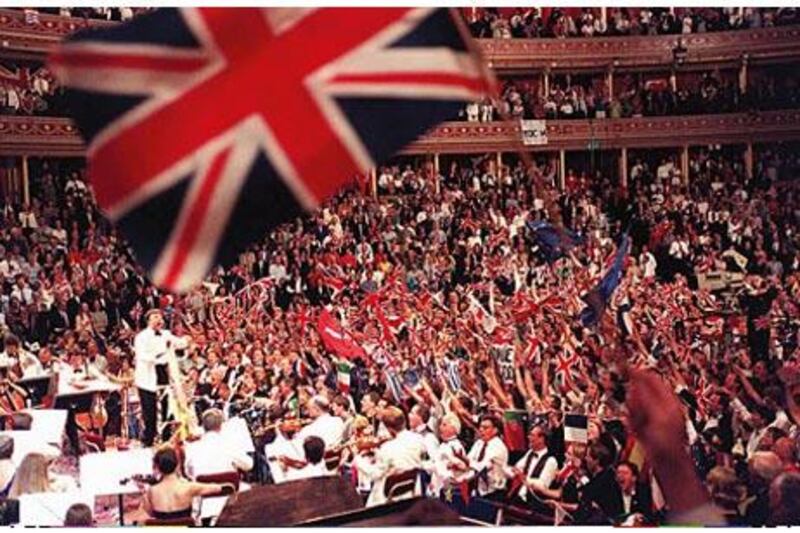What will the capital make of the Abu Dhabi Classics' attempt to recreate the Last Night of the Proms? Jasper Rees celebrates a highlight of the cultural calendar that shows the British at their battiest, enjoying music from an era when their country 'ruled the waves'. There is a moment during the Last Night of the Proms when you wonder about the sanity of the British. It's not when all those Union Jacks are flapping under the vaulted roof of the Royal Albert Hall. Nor when patriotic lungs burst with sturdy tunes evoking a long-gone era in which Britain, so the song has it, "ruled the waves". True, to a certain type of liberal Brit brought up on multiracial inclusion and dwindling postwar influence on the world stage, those displays of nostalgic chest-pounding are all rather embarrassing.
But no, the bit that always gets me is when the whole of the front row of the audience - grown men and women in evening dress and a variety of party hats - starts bobbing up and down to the music, in regimental unison. It looks deeply weird. Britain is a nation with a gift for eccentricity. Prommers, a small group of dedicated classical music fans who go to every single concert of the two-month season, are the high priests of British battiness, and for one night of the year they have a starring role on BBC television.
The Proms, the world's greatest festival of classical music, has been held every summer since 1895, and in the Royal Albert Hall since the last war. For the most part it's all impeccably civilised, a celebration of everything from Bach to Bollywood. Across 75 concerts, the greatest orchestras in the world, and all of the major orchestras in Britain, are booked to perform. The Berlin Philharmonic are frequent guests. The Simón Bolivar Youth Orchestra of Venezuela had their first great international success there. And they are led by the most eminent conductors from Gergiev to Dudamel, and fronted by the most famous soloists, from Domingo to Lang Lang.
But when the Last Night finally comes round in September, it's all rather different. Especially after the interval. Access to the climactic concert is reserved for loyalists. You can only get in if you've bought tickets for at least five other Proms in the season. The audience goes the extra mile to turn it into a celebration, showing up in all manner of fancy dress, waving accessories from flags to teddy bears. The atmosphere flutters somewhere between British good cheer and infantilised frenzy.
The first half of the concert usually features a leading singer. Last year it was the bass-baritone Bryn Terfel in a suit apparently fashioned from a Welsh flag. This September it will be the great American soprano Renée Fleming. In the second half, a programme of old favourites is rolled out, year upon year, in an order barely changed since the 1950s. There's Elgar's Pomp And Circumstance March No 1 (Land Of Hope And Glory), whose bouncy rhythms trigger all that bobbing. Then comes Thomas Arne's Rule, Britannia! with verses sung by the soloist and choruses by the whole Hall, complete with serial encores. The official Prom is rounded off with Jerusalem, Sir Hubert Parry's setting of Blake's famous poem which summons images of "England's green and pleasant land", and then finally, of course, God Save The Queen. For one night only, robust British music rules the airwaves.
You can set your watch by the annual outburst of breast-beating. For detractors, the Last Night is thoroughly toe-curling. Under Tony Blair's New Labour there were frequent suggestions that such displays of sentimental jingoism were insufficiently inclusive, that all sections of Britain's diverse population could hardly be expected to buy into such rampant nostalgia for the certainties of Empire. It's certainly true that you don't see much evidence of the country's ethnic diversity at the Royal Albert Hall in the second Saturday in September.
For others, it's just a bit of fun, a harmless celebration of a sepia-tinted past. The argument of the pro-Prom lobby is that other nations are allowed their demonstrations of national pride. Why not us? Why be ashamed of the Union Jack? Now who'll take "a cup o' kindness yet, for Auld Lang Syne?" That's the ditty by Robert Burns which the Prommers lead after the concert is over, to cheers and, no doubt, sweet, consoling tears.
The Last Night as an export opens a potentially fascinating new chapter in its history. At the Emirates Palace auditorium next weekend, the BBC Concert Orchestra will play many of the compositions traditionally played on the Last Night. Only one question: Can Abu Dhabi bob? The Best Of British gala will be held on Saturday, May 15, in the Emirates Palace auditorium. For ticket details, log on to www.abudhabiclassics.com










